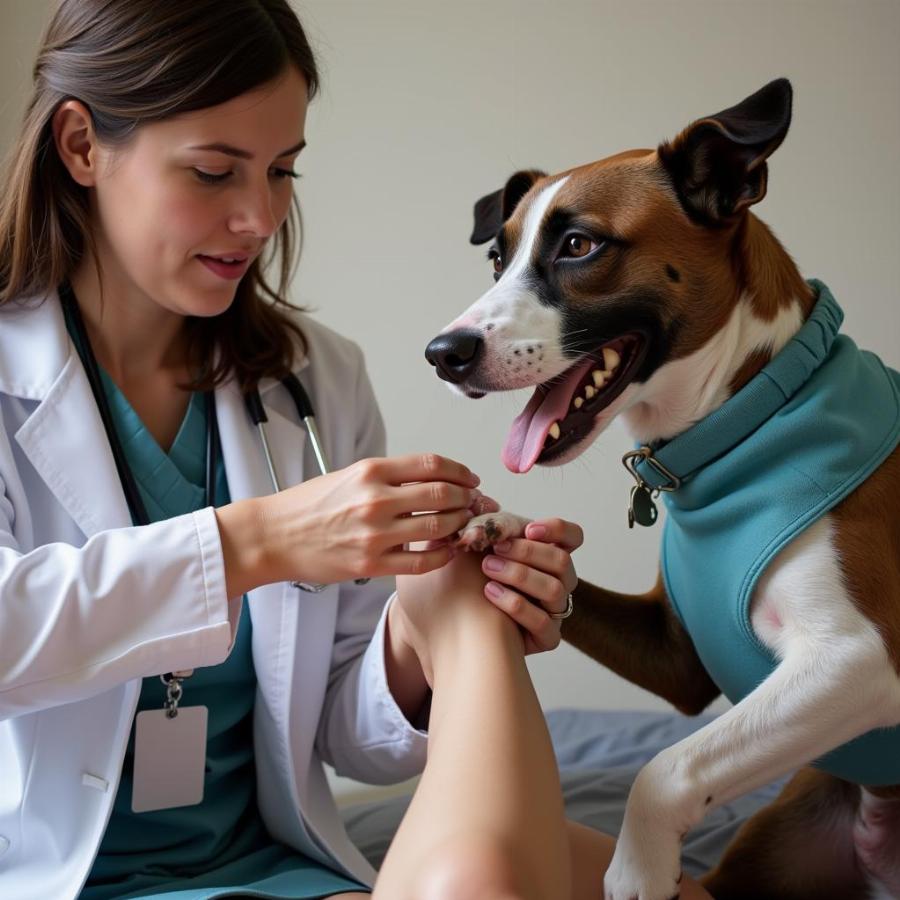A dog bite can be a traumatic experience, especially if it results in nerve damage. This article delves into the complexities of dog bites that cause nerve damage, focusing on the signs, diagnosis, treatment, and prevention. Understanding the potential severity of these injuries is crucial for every dog owner. We’ll explore how to recognize the symptoms of nerve damage after a dog bite and the steps you should take to ensure proper care for both the victim and the dog.
Recognizing the Signs of Nerve Damage After a Dog Bite
Following a dog bite, it’s essential to be vigilant for signs of nerve damage. These signs can be subtle or pronounced, ranging from tingling and numbness to complete loss of sensation.  Kiểm tra vết thương do chó cắn gây tổn thương thần kinh
Kiểm tra vết thương do chó cắn gây tổn thương thần kinh
- Numbness or tingling: One of the most common indicators is a loss of feeling or a “pins and needles” sensation around the bite area. This can indicate damage to the sensory nerves.
- Muscle weakness: Difficulty moving the affected area, especially if the bite is near a joint, can suggest damage to motor nerves.
- Loss of function: Inability to perform specific tasks, such as gripping an object or bending a finger, can indicate significant nerve impairment.
- Pain and hypersensitivity: While some nerve damage causes numbness, others can lead to increased pain sensitivity, even to light touch.
- Changes in sweating: Altered sweating patterns around the wound, either excessive sweating or a lack of sweating, can be another sign.
Diagnosing and Treating Nerve Damage from Dog Bites
If you suspect nerve damage after a dog bite, immediate medical attention is crucial. A doctor will conduct a thorough physical examination, assess the extent of the injury, and may order additional tests like electromyography (EMG) or nerve conduction studies to confirm the diagnosis and determine the severity of the damage.
Treatment options vary depending on the type and severity of nerve damage. They can range from conservative approaches like physical therapy and pain management to more invasive procedures such as surgery to repair damaged nerves.
Preventing Dog Bites and Subsequent Nerve Damage
Preventing dog bites is the best way to avoid the risk of nerve damage. Understanding dog behavior and responsible pet ownership are key.
- Socialization: Expose your dog to various people, animals, and environments from a young age to promote well-adjusted behavior.
- Training: Obedience training teaches your dog essential commands and helps establish clear boundaries.
- Supervision: Never leave children unsupervised with dogs, regardless of how gentle the dog seems.
- Avoidance: Teach children how to approach dogs safely and to recognize signs of aggression. If a dog appears agitated or uncomfortable, it’s best to avoid interaction.
- Responsible Ownership: Ensure your dog is properly vaccinated and receives regular veterinary care.
Conclusion
Dog bites with nerve damage are serious injuries requiring immediate medical attention. Recognizing the signs, seeking prompt diagnosis and treatment, and focusing on prevention are essential for minimizing the long-term impact of these incidents. By understanding dog behavior and practicing responsible pet ownership, we can create a safer environment for both humans and animals. Remember, early intervention is key to a better outcome.
FAQ
- Can nerve damage from a dog bite be permanent? The extent of recovery varies depending on the severity of the injury. While some nerve damage can heal completely, severe cases may result in permanent impairment.
- How long does it take for nerve damage to heal? Nerve regeneration is a slow process, and recovery can take months or even years.
- What are the long-term effects of nerve damage? Long-term effects can include chronic pain, numbness, muscle weakness, and loss of function.
- What should I do immediately after a dog bite? Clean the wound thoroughly with soap and water, apply pressure to stop bleeding, and seek immediate medical attention.
- Is it necessary to report a dog bite? Yes, reporting a dog bite to animal control is important for public safety and can help prevent future incidents.
- Can I sue if a dog bites me and causes nerve damage? You may have legal grounds to pursue compensation for medical expenses, lost wages, and pain and suffering. Consult with a personal injury attorney to explore your options.
- How can I help my child cope with the emotional trauma of a dog bite? Provide emotional support, reassure them, and consider seeking professional counseling if necessary.